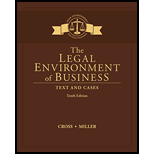
Case summary:A company, DSC sells its products to various companies including a company, SSP. A customer of SSP purchased the product of DSC from two competitors of SSP, due to which it lost its sales to that customer and others. The price of SSP was reported 10 to 15 percent higher than other companies. Company SSP sues company DSC for
To explain: The requirement to make claims under section 2 of the Clayton act by the company, SSP.
Case summary: A company, DSC sells its products to various companies including a company, SSP. A customer of SSP purchased the product of DSC from two competitors of SSP, due to which it lost its sales to that customer and others. The price of SSP was reported 10 to 15 percent higher than other companies. Company SSP sues company DSC for price discrimination.
To find:The facts which can prove the claim of company SSP.
Want to see the full answer?
Check out a sample textbook solution
Chapter 27 Solutions
The Legal Environment of Business: Text and Cases (MindTap Course List)
- 5. Glenn Dental Clinic provides general dental care to residents of Philadelphia on a walk-in basis. The clinic has started receiving complaints from patients that the waiting time is too long and has asked you to investigate whether this problem can be solved. Upon arrival, customers first receive a series of paperwork from the receptionist and fill out relevant information such as personal health records and insurance provider. The form is then handed back to the receptionist who enters the information into the computer system for the dentist to see. A dental assistant then takes an X-ray from the patient. A dentist then performs the checkup and discusses any issues with the patient. Based on conversations with staff members at the clinic, you have obtained the following information on the process: a. It takes about 5 minutes for a customer to fill out the paperwork. b. Entry of information on the paperwork into the system and verification with past records takes another 5 minutes…arrow_forwardOn January 1, 2020, Acme Corporation leased equipment to Zenith Company. The lease term is 10 years. The first payment of $850,000 was made on January 1, 2020. The equipment cost Acme Corporation $6,250,000. The present value of the minimum lease payments is $7,150,000. The lease is appropriately classified as a sales-type lease. Assuming the interest rate for this lease is 8%, how much interest revenue will Acme record in 2021 on this lease? a. $500,000 b. $504,000 c. $572,000 d. $624,000arrow_forwardHow many units were completedarrow_forward
- Why should businesses not set efficiency as the only goal? • Note: Include a reference with supportive citations in the discussion reply in your post.arrow_forwardFor the fiscal year, sales were $8,300,000, sales discounts were $100,000, sales returns and allowances were $45,000, and the cost of merchandise sold was $5,000,000. What was the amount of net sales? Accurate Answerarrow_forwardXYZ Corporation reports the following amounts for the fiscal year: Account Amount Assets $9,800 Liabilities $3,500 Stockholders' equity $6,300 Dividends $800 Revenues $7,200 Expenses $4,900 What amount should be reported for net income?arrow_forward
- Do you think there are other methods to achieve efficiency, such as specialization or using technology to alleviate the bottleneck, like patient wait time?arrow_forwardProvide correct solutionarrow_forwardI want to this question answer for General accounting question not need ai solutionarrow_forward
 BUSN 11 Introduction to Business Student EditionBusinessISBN:9781337407137Author:KellyPublisher:Cengage Learning
BUSN 11 Introduction to Business Student EditionBusinessISBN:9781337407137Author:KellyPublisher:Cengage Learning Essentials of Business Communication (MindTap Cou...BusinessISBN:9781337386494Author:Mary Ellen Guffey, Dana LoewyPublisher:Cengage Learning
Essentials of Business Communication (MindTap Cou...BusinessISBN:9781337386494Author:Mary Ellen Guffey, Dana LoewyPublisher:Cengage Learning Accounting Information Systems (14th Edition)BusinessISBN:9780134474021Author:Marshall B. Romney, Paul J. SteinbartPublisher:PEARSON
Accounting Information Systems (14th Edition)BusinessISBN:9780134474021Author:Marshall B. Romney, Paul J. SteinbartPublisher:PEARSON
 International Business: Competing in the Global M...BusinessISBN:9781259929441Author:Charles W. L. Hill Dr, G. Tomas M. HultPublisher:McGraw-Hill Education
International Business: Competing in the Global M...BusinessISBN:9781259929441Author:Charles W. L. Hill Dr, G. Tomas M. HultPublisher:McGraw-Hill Education





